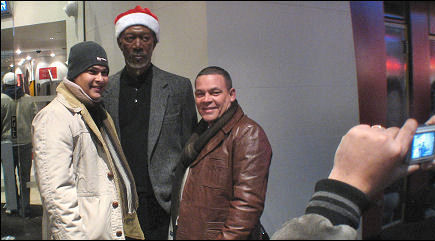N.Y. Times critic Manohla Dargis speaking (but not appearing) on the history of the screen vampire, from F.W. Murnau‘s Nosferatu and Max Shreck to the current “abstinence figure” vampire played by Robert Pattinson in Twilight — a figure who is “catnip to anyone with OJD (obsessive Jonas Brothers disorder),” as she says in her review.
Regrets
Nikki Finke revealed the the names of four publicists cut loose yesterday by PMK/HBH: Craig Bankey, Jennifer Holiner, Andy Snyder and Karen Oberman. I’m sorry. My heart goes out. If I ran a big company I’d never let people go just before the holidays. I wouldn’t care how much I’d suffer financially — I’d wait until January to chop heads. More humane that way.
On The Carpet
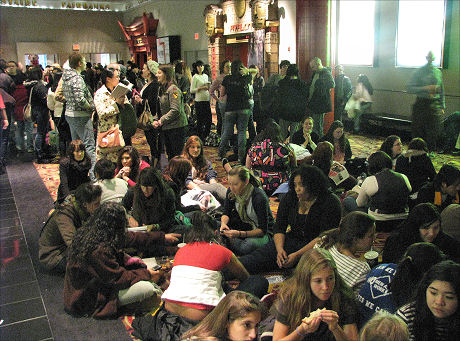
Twihards waiting for the midnight show of Twilight in lobby of AMC Lincoln Square — Thursday, 11.20.08, 10:15 pm
At Last, Revolutionary Road
Revolutionary Road is a corrosive and heartbreaking masterwork. Sam Mendes‘ best film yet is exquisitely cut, blended and calibrated with superb music by Thomas Newman and legendary performances from Leonardo DiCaprio, Kate Winslet and Michael Shannon. It’s the strongest heavyweight drama I’ve seen all year so far — much more searing and moving than I expected.

During Thursday night’s post-Revolutionary Road screening q & a at the AMC Lincoln Square — (l. to r.) moderator Glenn Kenny, costar Michael Shannon, star Kate Winslet — Thursday, 11.20.08, 9:25 pm
Turnaround Chill
A noted filmmaker who read this morning’s link to Patrick Goldstein‘s story that named Paramount’s Brad Weston as the guy who passed on Twilight two years ago when it was being developed by MTV Films has a word of caution. Or lament, rather. Here’s how he put it:
“When Goldstein ran that story, it increased the level of paranoia in the studios and now people aren’t as likely to put projects into turnaround, which is what saves or releases some projects and results in their being made into films at other studios,” he said.
“Without turnaround we’re all going to miss out on a lot of great movies because stalled projects are now more likely to just sit there and collect dust. It’s going to increase this chilling effect.”
“Let’s say I have a property that’s owned by a studio and it’s not working out,” he said. “In this situation a studio exec saying to me ‘fine, I’ll put it into turnaround and let you have it, take it across the street to Warner Bros. and God speed’ is usually an act of benevolence. It saves a project from death.
“Now with this Weston thing, a lot more studio execs and going to say ‘sure, I let you take it elsewhere and then two years from now I’ll read about how I’m the asshole who let a big hit go to some other studio? Fuck it, I’m going to hang onto it. I’d rather have the project die here than have it go elsewhere than have an article turn up down the road that’ll make me look stupid.’
“Fear of failure has always been a greater force in this town than dreams of success,” he coincluded. “This is a town based on fear, and now that fear, that paranoia, has just been increased.”
Big, Pumped, Extreme
Australia (20th Century Fox, 11.26) is extreme cinema by way of director Baz Luhrmann‘s massive ego. We all know Luhrmann is no fan of naturalism, but Australia‘s manifestation of ultramagical reality made me want to plotz. Call Luhrmann the anti-Budd Boetticher or Anthony Mann or Sam Fuller — a sworn aesthetic enemy of any solidly workmanlike approach to muscular outdoor filmmaking and telling forthright tales. Australia is a wackazoid big-canvas thing, and God help anyone who comes to it not willing to be injected with Baz serum.
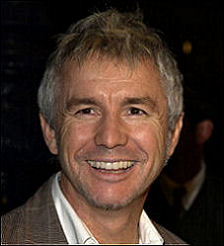
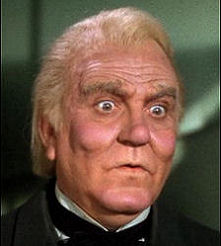
Australia director Baz Luhrmann; Wizard of Oz costar Frank Morgan
And that’s fine if you can roll with it. I couldn’t. It put me off. It’s too spiked with mescaline. And I say this as someone “experienced.”
Partly a love story, partly about Nicole Kidman‘s strangely immobile forehead, partly about an ambitious Red River-ish cattle drive and lastly — you could almost say anecdotally — about the bombing of Darwin, Australia, in early 1942, there isn’t a frame or line or gesture in this whopper of a movie hasn’t been hugely futzed with by way of emotional investment and/or digitally reconstitution. To me it felt just as hyper, cranked up and visually steroid as Luhrmann’s Moulin Rouge, Strictly Ballroom, Romeo + Juliet , etc. It’s nuts.
What is the primary focus of Australia? Baz Luhrmann’s big-dick imagination, and his determination and ability to visualize every last aspect of every last drop of rock-your-world razmatazz. He achieves that. A less talented fellow wouldn’t have tried, much less dreamt of such a thing.
All the rest of the elements and components — Kidman, the scenery, the cattle, the brawny and bearded Hugh Jackman, the cute Aboriginal kid Brandon Walters, the loutish big bellies in the bars, the evil-icious cattle barons David Wenham and Bryan Brown, the man-eating alligators, the Japanese planes that attack a tiny little island with nothing on it but a chapel, a minister and a bunch of intinerant children, the bloated and relentlessly rum-swilling Jack Thompson, David Gulpill ‘s Aboriginal spirit figure (called “King George”) and all the rest of it — are strictly secondary.
It all comes down to The Wizard of Oz, which is frequently and blatantly referenced. The bones of the story are told by Kidman to Walters, Judy Garland clips are shown twice, “Over The Rainbow” is sung, hummed and orchestrated. The metaphor is simple, mate. This is a film set in a country commonly referred to (certainly in the pages of old-time Variety) as Oz, and Luhrmann is the wizard — the puller of strings and levers behind the curtain, the kindly fellow pulling off a flim-flam, the rascal with the booming amplified voice, the releaser of clouds of billowing black smoke and other awesome effects.
Trust me — that’s all this movie is about. Look at me, I’m a wild man, look at what I can do, I’m so extreme I can barely stand it, welcome to my world, blah blah. It’s certainly eye-filling and, okay, emotionally gripping toward the end, but it taxes the soul and sets the foot a tapping.
Flack Whackings?
Nikki Finke reported this morning that she’s “hearing there’ll be economy-related bloodletting in the form of layoffs of even very senior reps at major entertainment public relations firms before the end of the year,” adding that “some longtime vets who handle big clients [may be] getting fired in the next 24 hours.”
A senior p.r. exec told me he’s heard nothing about this, but if it happens he won’t be all that surprised.
“Layoffs are happening in every sector,” he said, “and of course historically the entertainment industry is funded by credit and everybody knows that has dried up in recent months, and so people are gearing for a downturn in production and production starts. Plus there are still issues related to the unresolved SAG strke situation and so a lot of companies are preparing to cope along these lines.
“The next six months are going to be very difficult, especially for p.r. agencies with major corporate clients. A loss of a major corporate client can really hurt a company. Those companies are owned by conglomerates and there are numbers that need to be met on a quarterly basis, and that translate into some hard decisions.”
Mumbai Over New Orleans
Issues of quality and artistic merit aside, my Ray Walston Martian antennae readings are telling me that in terms of emotional mob-approval signals, Danny Boyle ‘s Slumdog Millionaire is beating out David Fincher‘s The Curious Case of Benjamin Button in the Best Picture contest as it currently stands. I’m just talking about a snapshot on a moving train, mind. Ten minutes from now we could be looking at different scenery.
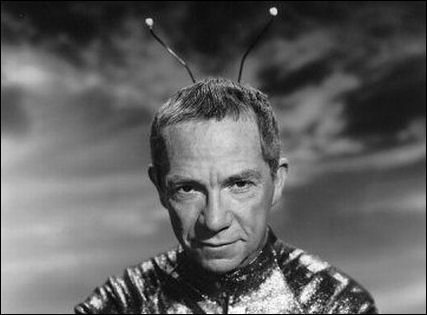
But it’s fair, right now, to make a spitball call and say that Millionaire might be taking over the front-runner position. No, it is taking over. A lot of folks are applauding, loving it (Real Geezers included) and telling their friends, and that’s the bottom line in this game.
I’m saying this based on the various meh reactions to Button that have been flying around for the last couple of weeks. The first high-profile, big-crowd Button screening happens tonight at L.A.’s DGA theatre, and the first big New York screening happens next Monday night so it’s obviously a little early to be making any firm calls. But so far I’m just not detecting any kind of “wow, blown away” reactions to the Fincher flick, although I’ve been told that one former big-time journalist is a huge fan. I’m sure there are others. I may be one as of next Monday evening.
I know that older, seemingly more thoughtful early-bird viewers have posted admiring comments about Button, and I’m certainly not writing it off. (Please understand that!) But the general rule-of-thumb is that any presumed Best Picture favorite has to have a detectable wave of emotional enthusiasm behind it, and for whatever reason — so far, at least — the middle-aged-men-getting-all-teary reactions to Button that were passed along a few weeks back haven’t manifested with the smarty-pants know-it-alls. Reactions have basically been “good but not great, no crying at the end, great technical achievement, beautiful photography, fine film,” etc.
And reactions like that are basically an “almost but no cigar.” A Best Picture winner has to be a manifestation of someone’s idea of a great, drop-dead, grand-or-penetrating-theme art film or it has to get people emotionally in a big way. Sorry, but them’s the rules.
I’m not even mentioning the measured reaction to Button that Oprah Winfrey conveyed when her Brad Pitt-Cate Blanchette Button special aired yesterday. Say what you will about Winfrey but she’s thought to be a kind of emotional geiger counter regarding the penetration power of certain movies and books, and a friend who caught the show thought it was significant that she used the words “fascinating” and “interesting” more than once to describe her reactions to Button. Make of this what you will.
In a way, it’s good for Button to be out of the font-runner slot. Now it doesn’t have anything to prove. Now it can sink or swim or soar based on what it is or isn’t, and what people are saying to each other on a day-by-day, screening-by-screening basis. And that’s fine.
Weston Did It
This Patrick Goldstein story is three days old and shame on me for not paying attention, but I didn’t understand the magnitude of Twilight until I saw it the night before last and particularly what a massive…no, titanic miscalculation it was for Paramount’s MTV Films to have put their development of the Twilight novels into turnaround back in ’06.
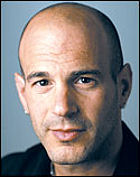
Brad Weston
Goldstein reports that “three ex-Paramount executives [have] all pointed the finger at Brad Weston, now the Paramount’s production chief.
Weston, naturally, “insists he never killed the project, saying it was the responsibility of Scott Aversano, who succeeded early Twilight champion David Gale, the MTV Films president who’s now a Paramount-based producer. “However, by the studio’s own timeline, the project was put in turnaround in early 2006,” Goldstein writes. “Aversano didn’t take over MTV Films until late August 2006 and had no functional budget to buy projects until the year’s end.
“MTV executives who were involved with the project say Weston questioned the genre’s commercial prospects, telling them to watch Cursed, a 2005 teen-oriented werewolf film that he’d made while an executive at Dimension Films, that had failed at the box office.”
Late to the Party
All the cheapie tourist shops in the Times Square vicinity are selling Barack Obama T-shirts, you can’t find a newsstand anywhere not selling bullshit Obama magazines (some perfect-bound), and TV ads are hawking commemorative bullshit Obama coins. But Madame Tussaud’s on 42nd Street, something of a celeb-ogling gold standard experience for people from Indiana, won’t have its life-size Obama figure “until January,” according to a Tussaud’s employee I spoke to yesterday.

Tussaud’s, in short, could be enjoying a huge surge in business due to Obama fever (i.e., folks having their picture snapped as they pose with the wax BHO), but management, the guy said, held off on starting work on an Obama figure until the 11.4 election. Every pollster in the business ran numbers starting last summer that strongly indicated an Obama victory over McCain, but Tussaud’s execs, to go by what I was told, wouldn’t commission an Obama figure until McCain was officially beaten. Brilliant! To me that means they’re (a) stupid or at least cautious to a fault, or (b) cash-strapped. Or both.
Here’s a shot I took two or three years ago of a popular Morgan Freeman Tussaud’s figure, obviously taken around the holidays.
